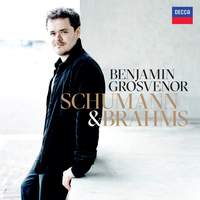Recording of the Week,
Benjamin Grosvenor plays music by the Schumanns and Brahms
A month on from Beatrice Rana’s superb pairing of Robert and Clara Schumann’s piano concertos, it’s the turn of Benjamin Grosvenor to explore the musical connections between the couple – with a tender postscript from their one-time house-guest and long-term friend Brahms.
The mainstay of his programme is Kreisleriana, which Robert composed at breakneck speed in the spring of 1838, drawing inspiration from a fictional composer who appears in several novels by the German polymath E.T.A Hoffmann. Robert described the piece as one of his favourite compositions in numerous letters, though his new fiancée responded with rather modified rapture on receiving a copy of the manuscript: as Katy Hamilton recounts in her excellent booklet-note, Clara candidly informed her future husband that some of the music ‘actually frightens me’ and expressed a certain trepidation about the prospect of marriage to its creator.
 Listening to Grosvenor’s shape-shifting interpretation, it’s easy to see why Clara found elements of the work disconcerting, though from the opening bars it’s impossible to resist falling under its uncanny spell. This is a set of pieces where mood and atmosphere can turn on a dime: the composer conceived it in part as a dialogue between his alter egos, the passionate Florestan and the more reflective Eusebius, and Grosvenor gives both sides of the coin their due and more. The first movement bursts into life in a flurry of stormy semiquavers, and Grosvenor hits the ground running - it feels as if the microphones have simply been switched on to catch him already in full flow.
Listening to Grosvenor’s shape-shifting interpretation, it’s easy to see why Clara found elements of the work disconcerting, though from the opening bars it’s impossible to resist falling under its uncanny spell. This is a set of pieces where mood and atmosphere can turn on a dime: the composer conceived it in part as a dialogue between his alter egos, the passionate Florestan and the more reflective Eusebius, and Grosvenor gives both sides of the coin their due and more. The first movement bursts into life in a flurry of stormy semiquavers, and Grosvenor hits the ground running - it feels as if the microphones have simply been switched on to catch him already in full flow.
There’s energy and clarity aplenty as he heads out of the starting-gates, but what really made me catch my breath was the way he steps off the gas at the one-minute mark, when the clouds part to admit a little ray of sunshine in the form of a gorgeous singing melody in the treble, which Grosvenor sculpts with the same tender loving care that made the Chopin selections on his debut solo recording so magical back in 2011. (Schumann dedicated Kreisleriana to the Polish composer, and received passive-aggressively short shrift – Chopin praised the cover-design and left it at that. But Grosvenor gently points up the diffident little homages to the dedicatee which are sprinkled throughout the even-numbered movements in particular, and listening to the way he shapes those elegant turns and arabesques had me wondering if Chopin himself might’ve been won over by a performance as sensitive as this).
Grosvenor consciously selected ‘works that are more static in their emotional landscape’ for the remainder of the programme, and the second of the Drei Romanzen Op. 28 offers a delicious oasis of calm after the storm – described by Clara as ‘the most beautiful love-duet’, its central melody is the equal of anything in Myrthen (composed as a wedding-gift to her the following year) and Grosvenor allows it to sing with eloquent simplicity.
It’s followed by the lovely ‘Blumenstück’ (somewhat bizarrely dismissed by the composer as a drawing-room bonbon ‘for women’) and the ‘Quasi variazioni’ movement from the Piano Sonata No. 3, which works beautifully in this new context – that it was composed on a theme by Clara prepares the ground nicely for her own set of variations on a melancholy little theme from her husband’s Bunte Blätter, written in 1853. Grosvenor’s immaculately-judged rubato (a constant throughout the programme) is an especial pleasure here, the theme subtly transformed with every appearance – it’s as if the music is being illuminated from a slightly different perspective at each turn, and there’s a wonderful sense of the lights being gradually dimmed as the first variation recedes out of sight.
As Hamilton points out in her notes, those variations were composed in the same year that the young Brahms came into the couple’s lives, and it’s his Three Intermezzi Op. 117 which close the curtain on this thoughtful recital. Written in 1892, they prompted Clara (then in her seventies and suffering with hearing difficulties) to remark that ‘at last I feel musical life stir once again in my soul’, and Grosvenor captures their mood of bittersweet intimacy so beautifully that I’ll wager her words will resonate with anyone in need of a musical pick-me-up.
Benjamin Grosvenor (piano)
Available Formats: CD, MP3, FLAC, Hi-Res FLAC, Hi-Res+ FLAC



